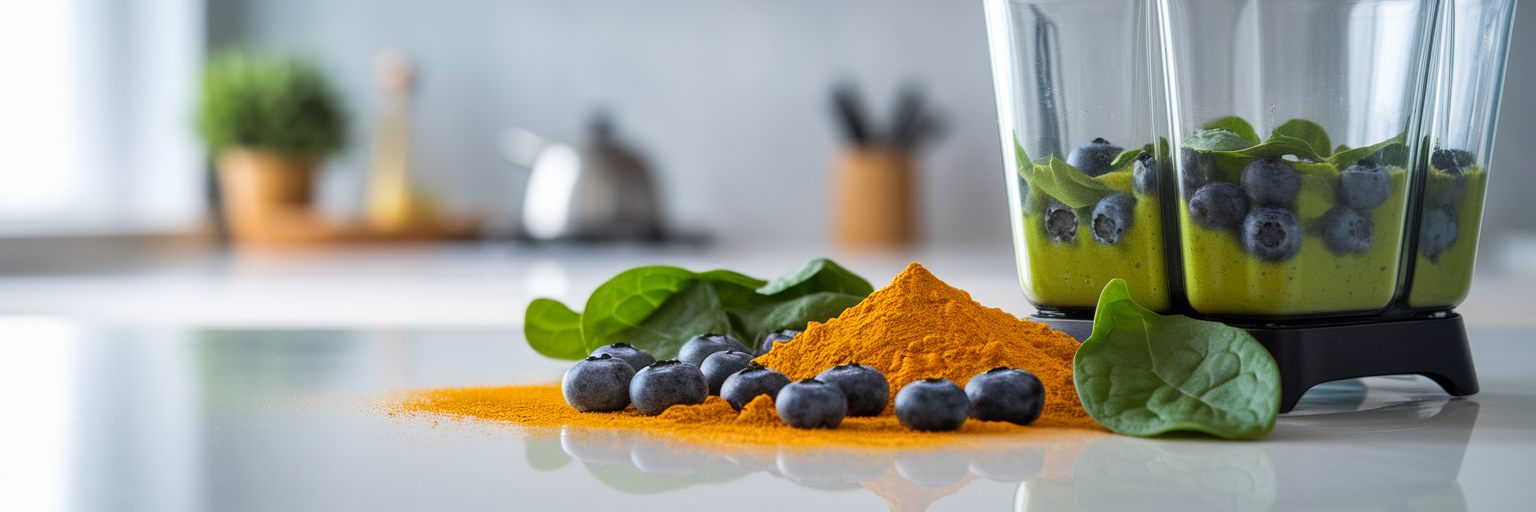If you lead an active life, you know the feeling. It’s that satisfying ache that settles into your muscles after a challenging hike, a new personal best at the gym, or a long weekend run. That temporary soreness is actually a good thing. It’s a sign of acute inflammation, the body’s natural and necessary process for repairing and rebuilding muscle tissue to make you stronger. This is the kind of inflammation that signals progress.
But there’s another, more persistent kind of inflammation that can quietly sabotage your fitness goals. Chronic, low-grade inflammation is the unwelcome guest that overstays its welcome, leading to prolonged soreness, slower recovery, and an increased risk of injury. For anyone who loves to move, the challenge is clear: how do you get the muscle-building benefits of a good workout without letting inflammation get out of control? The answer isn't to stop inflammation altogether, but to help your body manage it effectively.
This is where your diet becomes one of your most powerful tools. What you eat can either fuel the fire of chronic inflammation or help to cool it down. A strategic approach to your nutrition, particularly your protein source, can make all the difference. The right choices can significantly improve plant protein and muscle recovery, helping you bounce back faster and feel your best.
How Plant-Based Proteins Combat Inflammation
When we think about protein, our minds often go straight to muscle building. But plant-based proteins offer so much more than just amino acids. They come loaded with a powerful arsenal of bioactive compounds, like polyphenols and flavonoids. Think of these as the plant's own natural defense system. When we consume them, they act as antioxidants in our bodies, helping to neutralize oxidative stress and calm inflammatory responses at a cellular level.
This isn't just a theory. An anti-inflammatory plant based diet is consistently linked to better health outcomes. For instance, research highlighted by the Harvard T.H. Chan School of Public Health shows that diets with a higher ratio of plant to animal protein are associated with improved cardiovascular health, a key indicator of lower systemic inflammation. People who follow these dietary patterns often show lower levels of inflammatory markers like C-reactive protein (CRP).
What makes plant protein unique is the "whole package" it delivers. Unlike many animal-based proteins, plant sources are rich in fiber. This fiber is crucial for feeding a healthy gut microbiome, which acts as a master regulator of the body's immune and inflammatory systems. A happy gut means a more balanced inflammatory response.
And what about the concern of getting a "complete" protein? We can all picture someone asking if vegan protein is enough. Modern, high-quality vegan protein powders address this by combining different plant sources, such as pea and brown rice. This creates a robust profile of all essential amino acids needed for muscle repair, while also delivering a broader spectrum of those beneficial, inflammation-fighting compounds. For a closer look at how different formulas stack up, you can explore some of the best protein powders on our blog. Ultimately, choosing plant protein gives you a powerful one-two punch: the building blocks for strong muscles and the natural compounds to keep inflammation in check.
Key Anti-Inflammatory Ingredients in Vegan Proteins

Not all vegan protein powders are created equal. While the base protein is important, the most effective formulas are enhanced with specific ingredients known for their powerful anti-inflammatory properties. When you know what to look for, you can choose a product that does more than just refuel your muscles. It can actively help your body manage post-workout inflammation.
Here are some of the key players to look for on the label of a high-quality vegan protein for inflammation:
- Turmeric: This golden spice contains curcumin, a potent compound that has been studied extensively for its ability to block inflammatory pathways. It works at a molecular level to help regulate the body's response to physical stress.
- Ginger: A close relative of turmeric, ginger contains active compounds called gingerols. It’s been a go-to for centuries to soothe upset stomachs, but it’s also fantastic for helping reduce exercise-induced muscle soreness and pain.
- Chia & Flax Seeds: These tiny seeds are nutritional powerhouses, packed with alpha-linolenic acid (ALA). ALA is a plant-based omega-3 fatty acid that the body uses to create compounds that help resolve inflammation, essentially telling the inflammatory process when its job is done.
- Pea Protein: Beyond being an excellent source of protein, pea protein is naturally rich in branched-chain amino acids (BCAAs). These amino acids, particularly leucine, are critical for initiating muscle protein synthesis, which helps speed up the repair process and reduce the duration of inflammation.
- Hemp Protein: Hemp offers a unique and balanced profile of omega-3 and omega-6 fatty acids, including Gamma-linolenic acid (GLA). This balance is important because it helps the body maintain a healthy inflammatory response, rather than letting it become chronic.
Finding a formula that thoughtfully combines these ingredients, like our Chocolate Vegan Protein, ensures you're getting a synergistic blend designed for optimal recovery. To make it even easier, here’s a quick reference guide:
| Ingredient | Active Compound | Primary Anti-Inflammatory Benefit |
|---|---|---|
| Turmeric | Curcumin | Helps regulate inflammatory pathways at a molecular level. |
| Ginger | Gingerols | Helps reduce exercise-induced muscle soreness and pain. |
| Chia & Flax Seeds | Alpha-Linolenic Acid (ALA) | Provides plant-based omega-3s that help resolve inflammation. |
| Pea Protein | BCAAs (Leucine, Isoleucine, Valine) | Supports rapid muscle repair, reducing the duration of inflammation. |
| Hemp Protein | Omega-3 & Omega-6 (GLA) | Offers a balanced fatty acid profile that helps regulate inflammation. |
Note: This table highlights key ingredients and their recognized benefits for managing inflammation, making it easier to identify what to look for in a high-quality vegan protein supplement.
The Athlete's Edge with Plant-Powered Recovery
So, what does all this science mean for your actual performance? It’s simple: less inflammation means faster, more effective recovery. We all know that "can't-walk-down-the-stairs" feeling of Delayed Onset Muscle Soreness (DOMS) the day after a tough workout. While some soreness is expected, an anti-inflammatory diet can help take the edge off, allowing you to feel better, sooner.
Faster recovery is the secret weapon for consistency. When you aren't sidelined by excessive soreness, you can get back to your training more quickly and effectively. This consistency is what leads to real, long-term gains, whether you're building strength, improving endurance, or honing a skill. It’s no surprise that many consider certain formulas the best vegan protein for athletes because they directly support this cycle of work and recovery.
This isn't just a niche trend. There's a growing movement of elite athletes across the US who are adopting plant-based diets specifically for the recovery advantages. As highlighted in resources like the documentary The Game Changers, many athletes report feeling less joint pain and bouncing back quicker between intense training sessions. This gives them a tangible competitive edge. By proactively managing inflammation, they are investing in both their immediate performance and their long-term athletic health. This approach can be just as beneficial for your own fitness journey, and for those looking to optimize every aspect of their performance, you can learn more about other supplements in articles on our blog about creatine benefits.
Simple Ways to Add Anti-Inflammatory Vegan Protein

Making the switch to an anti-inflammatory diet doesn't have to be complicated. The key is to find simple, sustainable habits that fit into your active lifestyle. Here are a few easy ways to start incorporating anti-inflammatory vegan protein into your routine and begin to reduce inflammation with diet.
- Master the Recovery Smoothie: This is the easiest and most popular way to get started. A post-workout smoothie is the perfect vehicle for a high-quality vegan protein powder. Create a simple formula: 1-2 scoops of protein powder, a cup of unsweetened plant-based milk, a handful of spinach, and a cup of frozen berries or cherries, which are also packed with anti-inflammatory compounds.
- Make a Simple Swap: If you're already using a protein shake after your workouts, the simplest change you can make is to switch your current powder for a plant-based version. You don't have to change your routine, just the ingredients. This small adjustment can make a big difference in how you feel.
- Think Beyond the Shake: While protein powder is convenient, remember that it's a supplement to a healthy diet. You can easily add a scoop of unflavored vegan protein to oatmeal, mix it into plant-based yogurt, or even add it to pancake batter to boost the protein content of your meals. For more inspiration, check out these 3 easy vegan protein recipes you'll actually crave.
- Time It Right: To get the most out of your protein, try to consume it within 30 to 60 minutes after your workout. During this window, your muscles are primed to absorb nutrients for repair and recovery, making it the ideal time to refuel.
Choosing the Right Vegan Protein for Your Goals
Making the switch to a plant-based protein is a powerful step toward better recovery and performance. To make sure you're choosing a product that will deliver real benefits, here is a quick checklist of what to look for on the label:
- A Complete Protein Blend: Look for a multi-source blend, typically combining pea and brown rice protein, to ensure you're getting all the essential amino acids for muscle repair.
- Added Anti-Inflammatory Ingredients: Check for functional ingredients like turmeric, ginger, or omega-3s from chia or flax seeds. These are the extras that take a protein powder from good to great.
- A Clean, Simple Label: The best formulas have minimal added sugars, no artificial sweeteners or flavors, and are free from unnecessary fillers. You want more of the good stuff and less of everything else.
Ready to supercharge your recovery? You can explore our full range of products to find the perfect fit for your goals. And don't forget to share this with a friend who loves a good workout!



